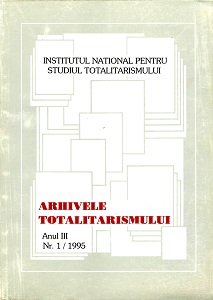Dictionar biografic
Biographical dictionary
Author(s): Cristian Troncota, Cerasela Moldoveanu, Horia Nestorescu-Bălcești, Gheorghe Neacșu, Gheorghe Tînică, Anișoara Budici, Adrian Brișcă, Alesandru DuţuSubject(s): Military history, Political history, Social history, Recent History (1900 till today), Security and defense, Studies in violence and power, History of Communism, Penal Policy
Published by: Institutul National pentru Studiul Totalitarismului
Keywords: biographies; Eugen Cristescu; Nicolae Dăscălescu; Teohari Georgescu; luliu Hossu; Nicolae Macici; George Manu; Çozma Pătrăucean; Mihai Șutzu;
Summary/Abstract: Eugen Cristescu (1895-1950) As chief of Security (1929 - 1934) and director general (16 November 1940 - 23 August 1944) of the S.S.I. - the Romanian security and information structures -. Eugen Cristescu contributed to the counteractions against the extreme right and left wing political trends in Romania. Arrested on 24 September 1944, he was taken to Moscow for interrogation. Brought back to Romania in April 1946. he was tried by the People's Tribunal, charged with war crimes and the country's disaster. He was sentenced to life imprisonment despite the fact that the administered evidence in his so-called "high-treason” trial failed to confirm the allegations. After having been investigated by Securitate, he died on 12 January’ 1950, in the penitentiary at Văcărești. Nicolae Dăscălescu (1884-1969) General Nicolae Dăscălescu took part in WW I, distinguishing himself in the offensives in Transylvannia and on the Moldavian front: in 1917, he was exceptionally promoted to the rank of major. In 1919, he participated in the campaign of the Romanian army in Hungary, fighting against the Soviet Republic in Budapest which was threatening Romania's territorial integrity. On 29 July 1945. after his glorious participation in the Eastern and Western campaign (1941-1945). he was sent into retirement without having been offered any explanation. General N. Dăscălescu was arrested twice, in 1946 and in 1951. He was released in 1955 and died on 28 September 1969, after prolonged suffering, deprivation and indignities. Teohari Georgescu (1908- 1976) Born on January 31, 1908, a printer, Teohari Georgescu was at the beginning a union activist and, starting with 1933. he became a Romanian Communist party activist; he climbed up the party's hierarchical ladder to the top, i.e.. the Secretariat of the Central Committee of the P.M.R. In 1952. he was removed from all party and state offices, alongside Ana Pauker and Vasile Luca, having been charged with participation in separatist actions. Sent back to the lower ranks, he directed the polygraphic enterprise he used to be an apprentice at decades ago. He died on January 1 1975. Later on rehabilitated, he was interred in the Heroes' Monument of Fighters for Socialism. luliu Hossu (1885-1970) Cardinal Iuliu Hossu, together with Miron Cristca. Vasile Goldiș and Alexandru VaidaVoevod, was on the prestigious delegation which brought over to Bucharest the document of the great Union, the Resolution voted for at Alba lulia. to be delivered to King Ferdinand. In the spring of 1965. after having suffered the communist hunt in Romania, he was promoted to the rank of cardinal "in pectorc" by Pope Paul the Sixth. Nicolae Macici (1886-1950) As a commissioned officer in the Romanian army. N. Macici took part in the 1913 campaign in Bulgaria. In 1916. as a captain, he participated in the campaign in Transylvannia. In 1941, he contributed to the reestablishment of the public order seriously perturbed by the Iron Guard rebellion. On 28 April 1945, under the pretext of his involvement with the operations in Transnistria and Odessa (1941), he was arrested and brought to court on the first trial of the Romanian "war criminals". He was sentenced to death, but his sentence was commuted, by a High Royal Decree, to forced labour for life. His indictment and sentence were unjustified. He died in prison, on 15 June 1950. due to the harsh prison regime. George Manu (1903-1961). It is in Paris that George Manu was awarded his doctor’s degree in physics: he was Marie Curie’s favourite student. In 1936. he was appointed associate professor to the Department of Nuclear Physics, University of Bucharest, where he worked together with Horia Hulubei. In 1937, he became a member of the Iron Guard movement, and was its a.i. commandant in 1943. Coopted in the steering committee of the National Resistance Movement (1945), in 1946 George Manu was indicted in the ’’Black Coats” trial. In 1948, he was sentenced to life imprisonment and forced labour. He died in prison on 12 April 1961. Çozma Pătrăucean (1909-1992) Descending from a peasant's family in the village of Straja, the county of Suceava, Cozma Pătrăucean was an anti-communist partisan in the mountains of Bukovina. Hunted by the communist authorities for having punched a Jewess in public, he took refuge in the Bukovina forests in the autumn of 1948. in the company of Constantin Gherman, Constantin Cenușă of Putna. In August 1951, he was apprehended by Securitate and sentenced to 22 years' imprisonment. Mihai Șutzu (1891-1942). Colonel Mihail Șutzu distinguished himself on the Eastern front, in the battles fought by Group I Mountain Artillery he commanded both in Northern Bucovina and while advancing across the Nipru and Crimea, in the Sevastopol zone. On 14 June 1942. while on the front line, he was severely wounded and died on the following day despite medical assistance.
Journal: Arhivele Totalitarismului
- Issue Year: III/1995
- Issue No: 1
- Page Range: 202-228
- Page Count: 27
- Language: Romanian
- Content File-PDF

